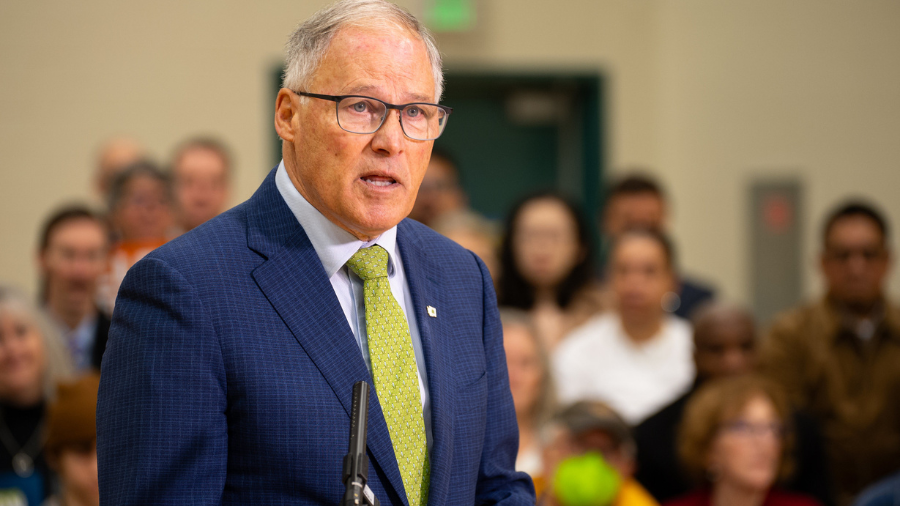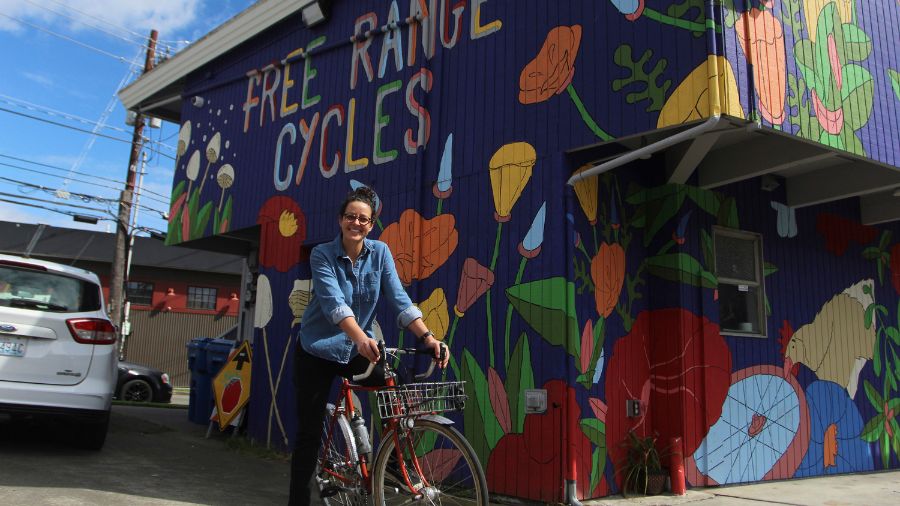Gov. Inslee proposes ambitious $72B budget for 2024-2025
Dec 14, 2023, 12:32 PM

Gov. Jay Inslee previews his legislative agenda for the upcoming session on Monday, Dec. 11. (Photo courtesy of Jay Inslee's Flickr page)
(Photo courtesy of Jay Inslee's Flickr page)
Governor Jay Inslee unveiled an expansive supplemental budget for 2024-2025, featuring $72 billion in increased operating expenditures. This budgetary surge is supported by various revenue streams, notably a proposal to allocate a $941 million surplus collected from pollution credits under the Climate Commitment Act.
The surge in forecasted near general fund revenues since the 2023-25 budget took effect in July has paved the way for this substantial increase in spending. Notably, from March to November, forecasted near-general fund revenues soared by over $2.9 billion, surpassing the $2 billion rise in costs related to ongoing services, higher caseloads, and inflation. The surplus from new revenue sources like the Capital Gains Tax has facilitated covering these escalating costs.
More from WA: Julie Timm announces departure from Sound Transit
During his proposal announcement the Governor said he is happy with his policies and sees little change needed.
“It’s generally following the prioritization of the state of Washington, which was right to begin with. And if you’re right to begin with, you don’t change it”, Inslee said.
Governor Inslee’s budget plan draws from three primary sources: The operating budget, the Climate Commitment Act and funds from the Capital Gains Tax. The unexpected surplus from the tax will be channeled into K-12 construction proposals.
The breakdown of this budget reveals a substantial portion dedicated to targeted policy initiatives:
- Utility Relief: $150 million from the CCA surplus will offer energy relief to approximately 750,000 individuals, averaging around $200 per person.
- Culverts: Acknowledging potential higher-than-estimated costs, $150 million has been allocated for culvert maintenance, potentially necessitating an additional $3 billion in the future.
- Right-of-Way Housing: $100 million will cater to 1200 housing units for individuals living along state highways.
- Homeless Camp Cleanups: $10 million is allocated for clearing camps along highway rights-of-way.
- Behavioral Health and Opioids: The budget proposes substantial investments, including $449 million for behavioral health and $69 million for opioid education and treatment options. This supplements the $1 billion allocated in the previous budget for transforming Washington’s behavioral health system and over $200 million for substance use disorder.
Inslee’s supplemental budget significantly emphasizes housing and homelessness, allocating $140 million to prevent evictions, create affordable housing and address encampments. Notably, the Rapid Capital Housing Acquisition program receives a substantial boost of $100 million to swiftly provide new shelter and housing options for those in encampments.
More from Matt Markovich: Inslee claims WA to receive $900M surplus from pollution credits
The Governor said the money is needed because the original $149 million for this year has run out. According to the Department of Commerce’s website, the state has found temporary housing for 816 people with 149 who have found permanent housing who had been living along state highways.
“We’re getting permanent assets that we control. We’re helping maybe hundreds over the next 60 years because we have that asset available to them for a place to live,” he said.
State Senator Lynda Wilson, R-Vancouver, and the ranking Republican on the Senate Ways and Means Committee agreed with some of the investments the Governor is making but wants more of the $941 million in CCA money to go back to taxpayers.
As part of the Governor’s proposal, $200 credits on utility bills of nearly 750,000 low-income households will be paid with money collected under the Climate Commitment Act.
“I would certainly encourage more of that Climate Commitment money going back to the people,” Wilson told MyNorthwest.
With the democratically led legislature set to deliberate and approve this extensive spending by the end of the 2024 session in early March, Inslee’s budget proposes ambitious investments across critical sectors, aiming to address immediate needs and fortify long-term initiatives for Washington.
You can read more of Matt Markovich’s stories here. Follow Matt on X, formerly known as Twitter, or email him here.













